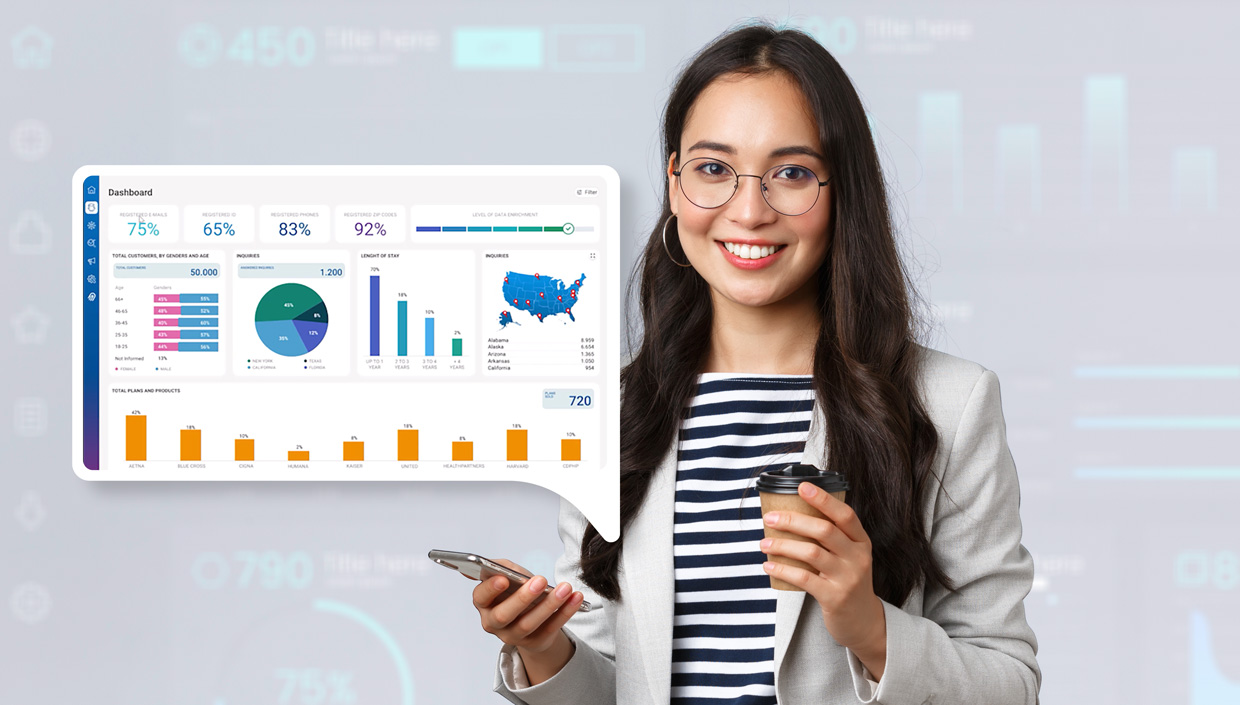Data-Driven Marketing: How Big Data Drives New Revenues
 Zoox Smart Data - 15 de September de 2021.
Zoox Smart Data - 15 de September de 2021.
Marketing has undergone constant change in recent years. Old decisions have gone down the drain - that is, working only with suppositions, hunches, and epiphanies. Today, marketers are turning to more reliable sources of information: data.
Some, however, are still reluctant to adopt this data-driven strategy. Often because they don't know where to find relevant data or don't have efficient tools at their disposal. In general, they don't know how to access, analyze, and compare the information they have.
Before we begin, we want to reassure you about one thing: the idea of data-driven marketing may seem confusing at first glance. But you will notice that many strategies will be familiar, but much more effective if based on Big Data. So we will try to present an approach as simply as possible. Let's get started?
Data-Driven Marketing is the ideal approach to optimize brand communications based on concrete information. Professionals in this field use data to predict future needs, wants, and behaviors of potential customers - all following the privacy and data protection legislation in force. This insight helps develop customized marketing strategies for the highest possible return on investment (ROI).
Data-driven marketing is a priority for marketing leaders - 40% of organizations aim to increase data-driven marketing budgets, and 64% of marketing leaders report that strategies based on these concepts are critical in the current economic scenario.
But how does data-driven marketing differ from traditional marketing?
To understand the difference, we must revisit the original premise of this field. In its simplest form, marketing has always focused on two goals:
- Discover the needs and wants of customers.
- And then use that insight to deliver what customers wanted to buy.
In practical terms, this meant gaining a deep understanding of the target audience, identifying and anticipating customer needs to finally develop strategies to deliver products that promise to solve those needs. Traditional teams used to combine 2 factors to achieve these goals:
- Market research available at the time, and;
- Assumptions, lots of assumptions about the target audience.
This approach, unfortunately, was often based on trial and error alone. Companies had to launch countless campaigns to find the one that was able to capture the audience. A laborious and costly modus operandi to say the least.
In contrast, data-driven marketing allows industry professionals to connect with customers at the right time. And with the right offer. But the benefits of using data go beyond just improving communications. Modern marketing teams use insights, for example, for:
- Personalizing the customer experience,
- Gaining new customers.
- Tracking, measuring and improving strategies in real time.
- Customer journey mapping / analysis
- A/B testing
- Site personalization
- Segmentation
Among other options to boost business.
The Benefits of Big Data in Marketing
So far, we've discussed how Big Data helps marketers make better decisions, which in turn generate better and faster results. And it works, as 2 out of 3 leaders admit that data-driven decisions trump instinct.
In addition, marketers can also benefit from data in other ways. For example:
1 - Big Data helps gain more clarity about the target audience
Any information about customers allows marketers to have an accurate understanding of their target audience. Insights from CRM can increase a professional's ability to predict more about customer behavior.
The result? Marketing campaigns that ensure customers are reached with the right message at the right time.
2 - Data offers the ability to build better connections with potential customers
With data, marketers can build better relationships with their personas. Moreover, they can do this in a scalable way.
In an article in Forbes, Tom Benton, the CEO of the Data and Marketing Association, was precise:
"The vast amount of data from an almost infinite combination of media, devices, platforms and channels allows marketers the opportunity to deliver 1-to-1 customer experiences at scale. If they are leveraged properly, a company, with a million customers, can offer an experience as personalized as a company with a dozen customers. "
A good example is in the real-time data of a campaign, which helps the marketer adjust it to match customer engagement. As a result, they can deliver a campaign that matches the audience's expectations continuously.
3 - Discover the best channels
Data can reveal not only the preferences of a target audience. They can also suggest which channels a brand should use to engage its audience now and in the future. This insight, in turn, can help position communication where your target audience is.
4 - Personalization
Many users today are skeptical of generic marketing communications that impact them.
One study revealed that 74% of customers feel frustrated when they see irrelevant content from brands. And 79% of them will not consider an offer unless a brand personalizes it. Therefore, marketers must focus their efforts on personalizing the experience of potential customers.
With the help of data, it is possible:
- A holistic view of your personas. Help identify triggers, intentions, and desires, for a better campaign strategy.
- Generating individual customer information, therefore, can enrich the brand's communication with the user.
However, does it work? Well, it does. A McKinsey&Company research shows that personalization can deliver 5 to 8 times the ROI on marketing spend and lift sales 10 percent or more.
Data Driven Marketing involves collecting user data and then using that data to create your marketing strategy. Understanding customer behavior is the key to delivering the right content to customers. In other words, data driven marketing helps you create content that is in sync with the expectations, behaviors, and demographics of the people you want to reach.
Data Driven Marketing and business performance
Data is an integral component of any successful marketing or advertising strategy. Once a new concept, Data Driven Marketing is now essential for enhancing connections and experiences, building customer loyalty, and, of course, getting new business opportunities.
According to Zoominfo, 78% of organizations say that data-driven marketing increases lead conversion and customer acquisition; 64% of marketing executives "strongly agree" that data-driven marketing is crucial to success in a hyper-competitive global economy; and 66% of marketing leaders have seen an increase in new customers as a result of data-driven initiatives.
But as we mentioned at the beginning, some marketers are reluctant to implement a data-driven approach.
Performance Partnerships author Robert Glazer says that "clicks, time spent, and conversion rates only describe what people do, not why they do it. Senior executives are addicted to numbers and have become dependent on analytics. This approach fails to understand what really motivates customers."
Data, no doubt, is essential to any strategy, but it is not always the only thing that will help drive your business forward. Good ideas, creativity, and even mistakes are part of everyday life, and they add up. What doesn't make sense is to make mistakes by insisting on a mistaken and baseless idea.
Let us adapt a well-known saying to our reality of Big Data and Data Driven: "The more data generated, the luckier I am.” The objective of this and many other Zoox contents is to objectify your strategies and make them less based on guesswork. And, for the marketing industry specifically, we could define it as a practice of distilling abundant data to understand how to make offers that people want to buy.
If you are interested in going further with your data-driven transformation and enhance your business capabilities, speak to a Zoox specialist to request a demo.
We are present in 23 countries with our multilingual robust platforms and data ecosystem, count on an immense inventory, with 24/7 support, visual dashboards and easy-to-navigate interface. Set up a free consultation and understand our possibilities for your brand.






Comments